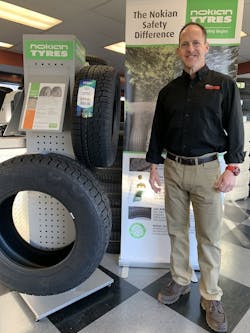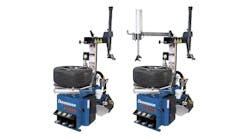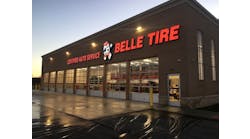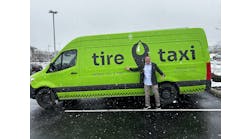Mild temperatures, not all-weather tires, are to blame for a slower winter tire selling season for some independent tire dealers.
Winter tire sales took a hit this year for dealers in the eastern part of the country, where the winter of 2020 generally has been wetter, rather than snowier or colder, than average.
“Our winter tire sales have decreased year over year, mostly due to the lack of snow,” says John Murray, manager of purchasing, inventory and logistics for Cleveland, Ohio-based Conrad’s Tire Service Inc. The dealership, which goes to market as Conrad’s Tire Express and Total Car Care, operates 38 stores in northeastern Ohio.
It’s the same for Randy Jones, president of Tireman Auto Service Centers Ltd. Based in Toledo, Ohio, his dealership operates 20 stores in northwestern Ohio and southern Michigan. “Winter tire season has been very slow so far due to the mild weather,” he says.
There are 59 VIP Tires & Service stores operating in Maine, New Hampshire, Vermont and Massachusetts. Winter tire sales overall have been positive, according to Blair McGaughey, the dealership’s director of tire merchandising. “Typically, our customers buy in anticipation of the winter season or will purchase prior to coming major snowstorms.”
Howie Fetzer owns one store in Fairfield, Conn. He pins softer than normal winter tire sales at his dealership, Fetzer Tire and Automotive Repair Service, squarely on lack of traditional winter weather. Fetzer says he is seeing more consumers moving to all-weather tires from all-season tires, not winter tires.
The weather has not changed selling dynamics for Graham Tire Co., which is based in Sioux City, S.D., and has 31 locations throughout South Dakota and Nebraska. “We do not sell a lot of snow tires to begin with, and we do not order in any type of significant supply to have in stock,” says David Mickelson, CEO and president of Graham Tire’s South Dakota and Nebraska locations. “We will order them in based on customer requests.”
Much of 2020’s harshest cold and big snow events have occurred in the western part of the country. Jason Smith’s five-bay dealership in Frisco, Colo., Utopia Tire and Service, has been in the midst of it. The store is in the Rocky Mountains, less than a half mile from Interstate 70 and about 75 miles west of Denver.
At 10,000 feet above sea level, Frisco is going to get snow “just as sure as the sun rising,” says Smith. Utopia Tire’s winter tire sales this year have been fantastic.
“We’ve been up double digits every year since I bought the store,” says Smith. Winter tire sales also got a boost from a new traction law in Colorado that extended the mandate for vehicles to be outfitted with tires that have earned 3-Peak Mountain Snowflake certification from September through May.
What motivates buyers
For some consumers, the winter tire buying decision is dictated by circumstance. “When they realize they have no traction, it forces the issue that they need to do something about it,” says Fetzer. A good experience with previous winter tires also can motivate many consumers to buy again for the upcoming cold season, according to Jones of Tireman Auto Service.
Conrad’s Murray has found that three factors often motivate customers to buy winter tires. One is a change in their vehicle’s driving performance, caused by degrading traction. Other customers may have purchased a new vehicle that is unable to perform to their previous vehicle’s capabilities. And for others, the buying decision may be prompted by original equipment tire limitations.
Whatever their motivation, winter tire buyers tend to be more informed than all-season tire buyers. “I do think that repeat snow tire buying customers tend to do a little more research and purchase from a basis of snow tire performance reviews than (when buying) a typical all-season tire,” says Murray. “We carry an opening price point snow tire line, and a premium snow tire line for this reason.”
All-season versus all-weather
The shift to all-weather tires is a good thing for highway safety, according to Fetzer. “The consumer is being misled about the safety of the vehicle they’re driving and the tires on that vehicle in winter conditions,” he says. “They don’t understand the difference between all-season and all-weather tires. A lot of people around here don’t want to deal with having two sets of tires. If you can accomplish that in one tire, they’re in favor of that product.”
Most of Fetzer’s customer do not drive on snow-covered or icy roads. “They’re driving on roads that are dry or wet 80% of the time, but they want that aspect of safety in winter that all-season tires do not provide them.”Colorado drivers, likewise, are mistaken about the capabilities of all-season tires and four-wheel-drive vehicles, according to Smith. “A lot of folks think that because they have four-wheel drive that they don’t need winter tires. However, everyone needs winter tires, especially for 4x4 vehicles.”
He says he explainsthe need to replace all-season tires on four-wheel-drive vehicles with a tire designed for severe conditions every day.
“For decades there’s been a misconception in this country that all-season means all-year, and that’s not the case, unless you live in Phoenix. Customers don’t understand that an all-season tire does not function well below 45 degrees, nor does it actually offer any winter traction.”
Most people think all-weather and all-season are the same. “We have to educate them on the differences in the compounding and the tread patterns,” notes Smith. “With all-weather tires, they’ve got a compound that will stand up to the heat of summer but still stay soft in winter conditions.”
Smith has had great success switching people from all-season to all-weather tires, and the availability of all-weather tires has not hurt his winter tire sales. Consumers who cannot afford two sets of tires especially value all-weather tires, he says. “I can put them on something that meets the winter traction laws that’s going to give them outstanding winter performance but now they don’t have to switch tires every six months.”
Conrad’s has purchased a limited amount of all-weather products with limited results, according to Murray. “I believe there are noticeable performance trade-offs, where traction, noise and longevity are constantly at battle,” he says.
Murray says there will always be a snow tire segment, especially in heavy winter weather regions “until and if a true all-temperature tire compound develops.”
But snow tire regions appear to be shrinking and consumer knowledge continues to fade in areas where snow may be limited. “As the all-season tire improves and provides consumers more confidence, I think the dedicated winter tires in less winter-effected driving will see a decrease,” says Murray.
McGaughey says all-weather tires sell well at VIP Tires and Service locations. “Because of our strong winters, winter tires are still in demand and we have not seen any cannibalization at this point.”
The Tireman Auto Service Center stores in Ohio and Michigan also do good business in all-weather tires.
“We’ve always had a strong following on all-weather tires, since we operate in an area that doesn’t always receive a lot of snow,” says Jones. “Many customers prefer all-weather tires so they don’t have to go through the changeover process.”
Mickelson says the Graham Tire stores in South Dakota and Nebraska sell many all-weather tires, too.
“I agree that most people have moved away from winter tires. We have terrible winters where we live with lots of snow and wind. However, the cities really do a great job of clearing the streets to make them drivable with decent tires.”
Looking ahead to next year
Smith plans to beef up his inventory of winter tires. “We have double-digit growth every year here at our store, so we’re constantly buying more tires and we’re constantly working out better deals with our vendors and with our manufacturers.”
He aims for all Utopia Tire employees to participate in ride-and-drives put on by tire manufacturers. “They’ve actually driven on the tires and compared them side by side. That allows us to meet our goal, which is always to treat every customer like they are our family or friend who is out there driving. We want to keep everyone safe.”
Fetzer says this year’s relatively mild Connecticut winter will not influence his winter tire purchase for next year. “We get deliveries twice a day, five days a week.”
Jones is planning to purchase fewer winter tires for his dealership as a result of the mild weather. “We will be more conservative in our winter tire purchases next season due to the anemic sales this year. Undoubtably, we’ll have several units left over this season.”
VIP Tire’s McGaughey did not specify upcoming purchases, saying he will be reviewing size and brand trends, programs and accounts for current inventory: “We basically stay with the same core brands, but look for opportunities in unique sizes or price points.”
Conrad’s will consider current or leftover inventory as part of its purchase program, reducing new purchases in 2020, according to Murray. “One of the challenges with snow tire inventory are the previous snow tire product lines being discontinued within a couple years, replaced with the newest and greatest, making clearing the old styles more difficult, and the margin-cutting that happens in the marketplace on these older products.” ■




